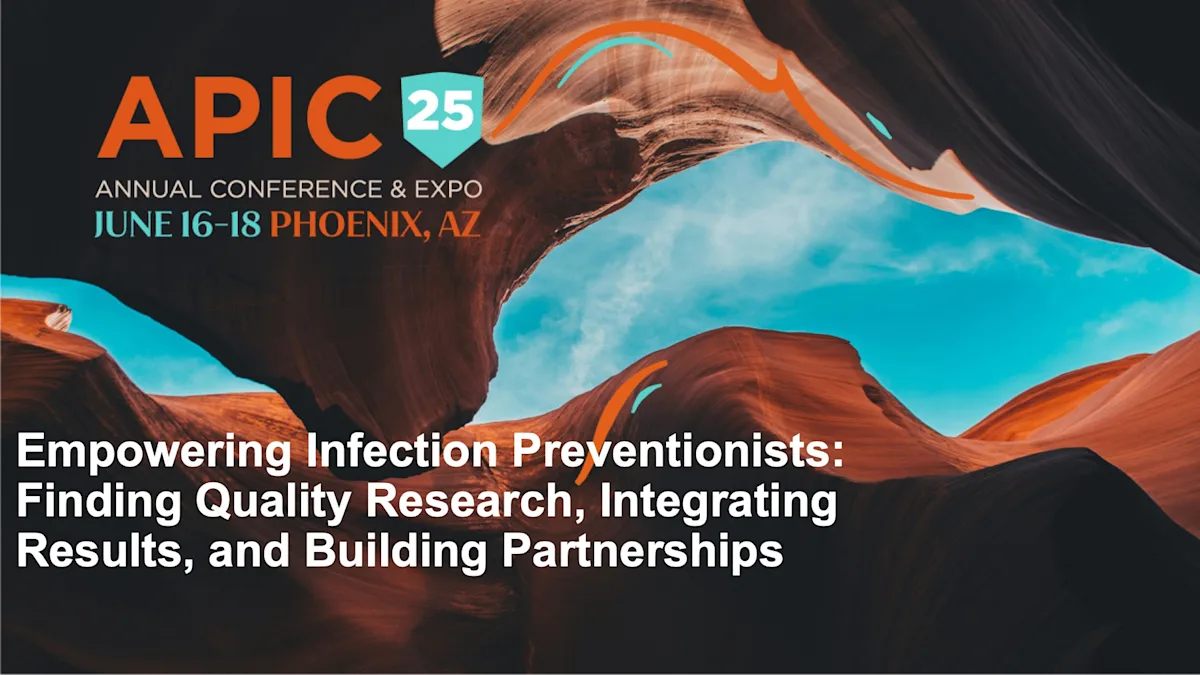ICPIC 2025: Exploring Infection Prevention on the World Stage
Infection prevention and control (IPC) is not unique to the United States (U.S.). Across the globe, clinicians, researchers, and public health professionals work every day to keep patients and the environments in which we treat them safer and healthier. Benedetta Allegranzi of the World Health Organization said it best: “Infection prevention and control (IPC) is essential, not optional.”

This year, my colleagues and I had the privilege to attend the 8th International Conference on Prevention & Infection Control (ICPIC) in Geneva, Switzerland, which featured 100+ oral presentations and 500+ posters. The conference covered a wide range of cutting-edge topics and brought together more than 1,000 experts, researchers, and professionals from around the world to share knowledge, research, and innovations in:
- Healthcare-associated infection (HAI) prevention
- Antimicrobial resistance control
- Infection prevention strategies
- Emerging technologies like AI in IPC
- Sustainability in healthcare environments
As I look back at my pages and pages of notes and hundreds of slide photos, one of the most notable takeaways is how relevant all the content was for us here in the U.S. Our challenges are not unique; they are universal. The sharing of research and resources only better equips us for the IPC challenges of today and those that lie ahead.
For this blog summary, I’m sharing two key insights from ICPIC and reflecting on how they resonate with our IPC challenges and opportunities here in the U.S.
1. Evidence-Based Storytelling
In ICP, if you want to tell a compelling story or make an informed decision, you need evidence to back it up. As W. Edwards Deming said, “without data, you’re just another person with an opinion.” Each ICPIC session told a story but also included the research on the slides to back up the story they were narrating.
Much like a TED Talk, the ICPIC speakers presented complex ideas in clear, engaging ways that were easy to understand and emotionally resonant. They used personal stories, vivid examples, and passionate delivery to connect with audiences on both intellectual and emotional levels, all while grounding their message in sound research.
“Without data, you’re just another person with an opinion.” — W. Edwards Deming
One of my personal favorite sessions was titled “Should We Decontaminate the Patients or the Equipment?” The speaker, Professor Brett Mitchell (Australia), presented the topic as a live debate, arguing both sides of the question and letting the research guide the discussion. His conclusion? Based on the evidence, you need to do both.
This format was both effective and engaging. It’s a lesson we can bring back to our own IPC practices here in the U.S. Whether you are presenting to the C-Suite at your hospital, speaking at a national conference, hosting a webinar, or simply trying to educate clinical colleagues, the way you deliver your message matters and so does the evidence you provide.
2. Sustainability and Infection Prevention: Conflict or Co-Benefit?
Infection Prevention inherently focuses on cleanliness and patient safety. That often means using disposable, non-reusable medical supplies such as personal protective equipment (PPE). Two speakers at ICPIC pointed out the significant impact of IPC on a healthcare system’s footprint. Graham Pike (UK) also talked on this topic and highlighted that “earth is the only place we can get our resources and they are not infinite.” While, Dr. Simpone Scheithauer (Germany) argued that “Preventative Medicine Is Intrinsically Sustainable” because preventing HAIs reduces the need for further treatment, which in turn lowers resource consumption.
According to both Dr. Scheithauer and Mr. Pike, one of the identified biggest opportunities to reduce waste in healthcare IPC is through identifying “co-benefit solutions.” These solutions create win-win outcomes for patients, providers, facilities, communities, and policymakers by generating multiple positive impacts beyond the primary objective.
“It might be the gloves. It’s always hand hygiene.” — 2025 WHO World Hand Hygiene Day Theme
The most obvious co-benefit solution in IPC today? Glove misuse and overuse. “Medical gloves worn when not indicated represent a waste of resources without necessarily leading to a reduction of cross-transmission of germs.” Dr. Scheithauer challenged the audience to apply this concept to other areas of IPC.
ICPIC 2025 reminded us that IPC is not just a clinical responsibility, it’s a global, interdisciplinary effort that thrives on evidence, innovation, and collaboration. Whether we are refining how we communicate research or rethinking our everyday practices, the path forward is clear: evidence-based, more intentional IPC benefits everyone.

















